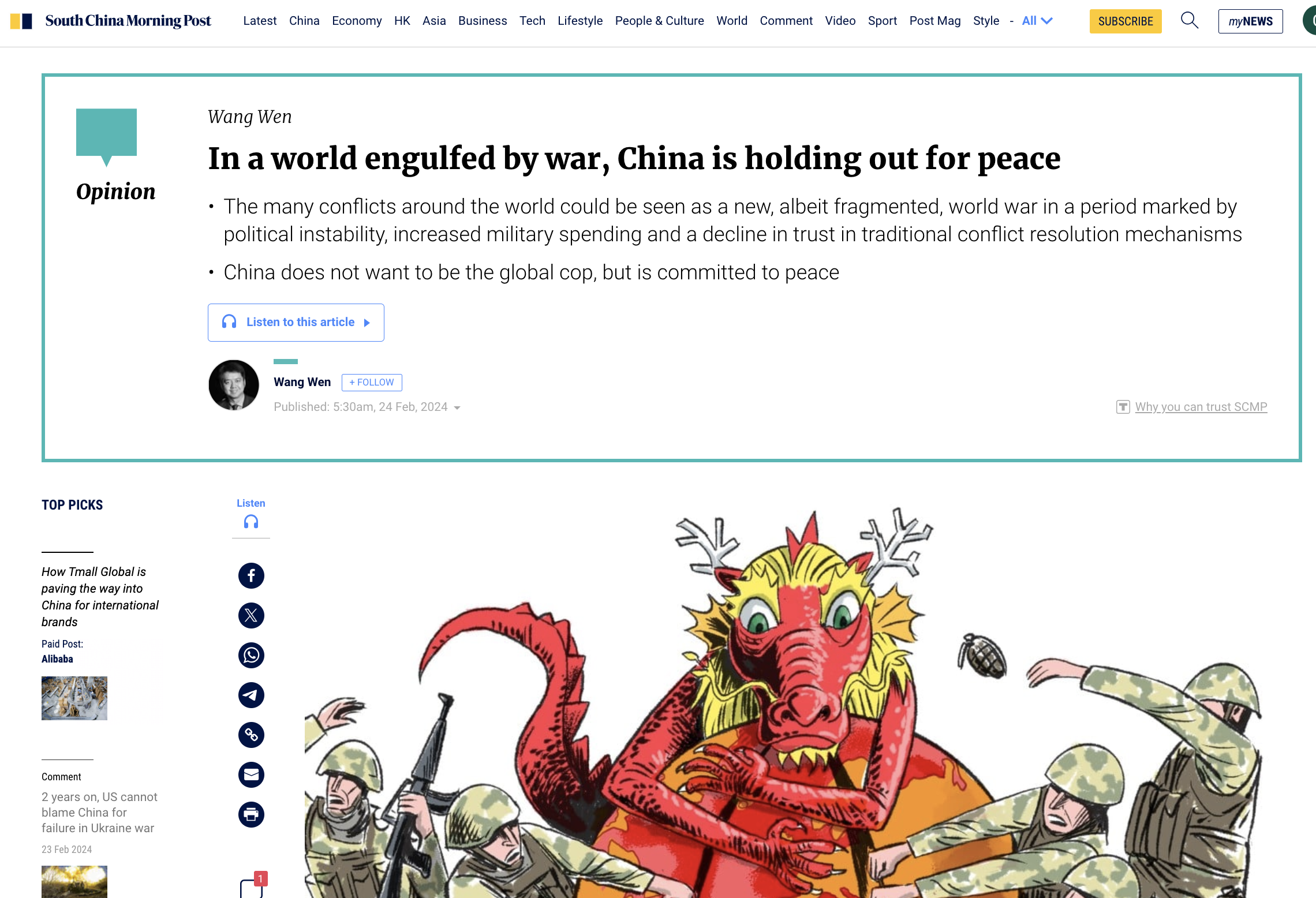LATEST INSIGHTS
Your Present Location: LATEST INSIGHTS[SCMP] Wang Wen: In a world engulfed by war, China is holding out for peace
Source: SCMP Published: 2024-02-24

A new world war is under way. For those living in developed countries, where gruesome battles remain mere headlines, it may not feel like the Earth is burning, but in 2022, according to the Peace Peace Research Institute Oslo, there were 137 conflicts around the world, resulting in over 224,800 deaths. The statistics for 2023 will no doubt be more chilling.
In 2022, a quarter of the Earth’s population, about 2 billion people, lived in areas directly impacted by military conflict. Battles and clashes between militaries, militias and zealots have put more people in danger than at any time since World War II.
While the first and second world wars featured large-scale battles throughout Eurasia, the current new world war is fragmented, but nonetheless global. Conflicts around the world now last between eight and 11 years.
These apparently unconnected conflicts have led to humanitarian disasters in all corners of the world, drawing in massive amounts of aid. In 2022, some 110 million people were displaced by war, persecution, violence and discrimination, far exceeding the 60 million people who were displaced during World War II.
More than 5.9 million people are seeking refugee protection in Europe because of the Russia-Ukraine conflict. The Sudan civil war that broke out last year has pushed more than 10 million people from their homes. In the past three years, seven military coups have occurred in African countries.
The brutality and destructiveness of the conflict in Gaza has shocked the world. More than half of the buildings in the Gaza Strip have been damaged or destroyed and 85 per cent of the population has been displaced.
Political instability in Venezuela, Ecuador and elsewhere is leading to more armed conflicts. The security situation in the Asia-Pacific is also challenging. The Korean peninsula, northern Myanmar and the Philippines are potential conflict hotspots.
The rise of localised military forces has become a new variable affecting global peace. In 2020, the International Committee of the Red Cross identified 614 non-state armed groups “of concern” to its humanitarian operations, with about 60 to 80 million people living under the control of these groups.
These groups are highly flexible and can trigger international disputes in unexpected places. If they become a proxy for major powers, they can quickly obtain hi-tech weapons, making the resolution of regional conflicts more challenging.
The traditional conflict resolution mechanism is at risk of complete failure, and international multilateral governance mechanisms, such as the United Nations and G20, no longer have the perceived authority or ability to bring about peace. Over the past decade, no war has ended through international mediation that concluded with a comprehensive peace agreement.
The lopsided post-Cold-War world order has created an international diplomatic environment that features an extreme lack of trust. Some countries see a solution to this disorder in abandoning the liberal institutionalised route characterised by unbending, high-minded principles, and returning to the more pragmatic path of realpolitik.
Yet, in 2022, global military spending reached a record high. The US accounted for about 39 per cent of global military expenditure in 2022, and its defence budget for 2024 is a record US$886 billion.
French military expenditure increased 7.5 per cent year on year in 2024 to US$49.7 billion; Japan is planning to spend US$55.9 billion, up 16.5 per cent; Russia military spending will jump a whopping 68 per cent to reach US$115 billion. In 2023, China reportedly allocated US$224 billion to its military, an increase of 7.2 per cent over the previous year.
Military weaponry is also undergoing a massive sea change with the help of artificial intelligence. This undoubtedly enhances the ability of a powerful country to launch, participate in or fund war. Poor citizens who are recruited to the army stand little chance of surviving the precision of the new generation of AI-guided weapons .
Many Chinese scholars once hoped that the United States would play a leading role in the development of true international peace. However, the influence of US global leadership is waning. The US is increasingly partisan in regional conflicts, even when it means its side will inflict greater suffering.
The multitude of conflicts globally interferes with the development of emerging economies, and are creating roadblocks to China’s rise. From China’s perspective, the US seems to be trying to protect its hegemony. A true global leader should be a conflict coordinator, not a troublemaker.
China is always ready to help mediate a conflict, but is unwilling to be the world’s judge, or global cop, even as it contributes 2,000 United Nations peacekeepers in various conflicts. It is very vigilant about the Russia-Ukraine, Palestinian-Israeli, India-Pakistan and northern Myanmar conflicts, and the potential military risks relating to Taiwan and the South China Sea. China hopes to have strong self-defence capabilities and realise the true unity of the country as soon as possible.
China does not want to get involved in war, as its peaceful record over the past 40 years shows. For the Chinese people, being its best self is China’s greatest contribution to world peace.
Perhaps it is difficult for the West to warm to China as it navigates the friction and differences with and between some of its 20 neighbours. If it is provoked and its red lines are crossed, China will not hesitate to defend its sovereignty. But isn’t that the first rule of every self-respecting country?
However, for a long time, China has been patiently suppressing the impulse to take military action, while wisely negotiating various contradictions. Although China faces many temptations to go to war and may be forced into it, it also hopes to be a peaceful damper, working hard to alleviate the new world war.
Wang Wen is professor and executive dean at Chongyang Institute for Financial Studies, Renmin University of China (RDCY)
Key Words: Wang Wen, War, Military Expenditure, Peace























































































 京公网安备 11010802037854号
京公网安备 11010802037854号





